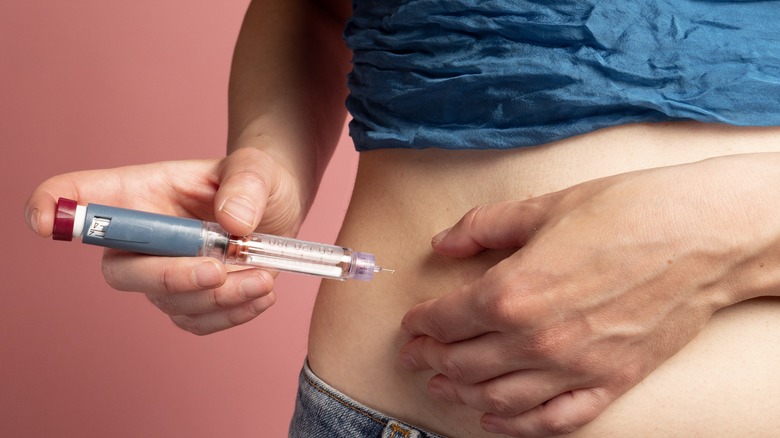Everything You Need To Know About Hormone Imbalances
If you've experienced rapid weight loss or weight gain, constantly feel fatigued, or have muscle weakness (or all of the above), there's a chance you may have a hormone imbalance (via Endocrine Web). As the name implies, a hormone imbalance occurs when there's too much or too little of a hormone being secreted into your bloodstream. Although the phrase may be more commonly associated with people who identify as female or who have a uterus, anyone can experience a hormone imbalance. It can be caused by a myriad of reasons or pre-existing medical conditions.
As the Cleveland Clinic explains, the body's endocrine system uses hormones to maintain homeostasis (this is when your body is in equilibrium) through your energy levels, growth, and response to stress and environmental factors. There are more than 50 different hormones in the body that have their jobs. Certain medical conditions like type 1 or 2 diabetes, obesity, or an over- or underactive thyroid can cause the endocrine system to be thrown off balance.
Although some hormone imbalances may be difficult to prevent (such as those caused by pregnancy or menopause, via the Endocrine Society), there are certain steps you can take to keep your body — and endocrine system — healthy. Additionally, according to Medical News Today, several potential treatment options are effective, like hormone replacement therapy and oral medications.
Signs and symptoms of hormone imbalances
Several symptoms may signal that you have a hormonal imbalance, and these can differ based on the source of the imbalance. For example, in women or people who have a uterus, things like menopause, perimenopause, or pregnancy can trigger irregular periods, hair loss or thinning, vaginal dryness, and a loss of libido, among others (via WebMD). Meanwhile, thyroid conditions like hypothyroidism (an underactive thyroid) — which are more common among middle-aged and older women, but which can affect anyone – can include symptoms such as constipation, dry skin, and pain or stiffness in the joints or muscles (via Mayo Clinic).
While the source of your hormone imbalance may impact the symptoms you notice, there are some general ones that you can look out for: Abrupt weight loss or weight gain (especially if you experience difficulty losing weight), consistent fatigue or weakness in your body, and new or worsening feelings of depression and anxiety are all common symptoms (via Cleveland Clinic).
Causes of hormone imbalances
Many factors can cause a hormonal imbalance. Some of the most common causes for people with female hormones occur at predictable or natural points, like menstruation, puberty, pregnancy, and menopause (via Baptist Health). In these cases, there isn't much to be concerned about unless your symptoms are persistent or uncomfortable. Additionally, there are some treatment options for particularly bothersome symptoms caused by menopause.
Certain medical conditions can cause a hormone imbalance. Polycystic ovarian syndrome (PCOS), for example, is a very common condition that occurs most frequently in people of reproductive age. According to the Mayo Clinic, people who have PCOS may experience infrequent or prolonged menstrual cycles, sometimes due to an excess of androgen (a male hormone) in the body. Other medical conditions that can cause a hormonal imbalance include pituitary tumors (the pituitary gland is the major endocrine gland, which heavily impacts the release of hormones in the body), type 1 and type 2 diabetes, overactive or underactive thyroid (hyperthyroidism and hypothyroidism), cancers that impact the endocrine glands, anorexia, Prader-Willi Syndrome, and inflammation of the pancreas (via Baptist Health).
Outside of existing medical conditions, some lifestyle habits can impact your hormones, too. An unhealthy diet, excessive stress, birth control medications, and a high percentage of body fat can all potentially be causes of hormone imbalances.
Who can have a hormone imbalance?
Anyone can have a hormonal imbalance. They're not exclusive to people who identify as female, those who menstruate, or those who have ovaries. According to Medical News Today, people who were assigned female at birth (AFAB) can experience hormone imbalances during certain stages of life, like puberty, pregnancy, breastfeeding, and menopause. Meanwhile, people who were assigned male at birth (AMAB) can experience an imbalance of testosterone. People who don't produce enough testosterone can undergo a variety of symptoms, ranging from breast tenderness to erectile dysfunction (ED), or a decrease in beard or body hair growth.
Children can also experience a hormone imbalance. Some kids go through delayed puberty, but others may have a medical condition called hypogonadism. This can cause a lack of development in muscle mass, a voice that doesn't deepen, body hair that doesn't grow, and more.
People who are obese or who have diabetes or other certain medical conditions can also have a hormone imbalance.
How to get tested and diagnosed for a hormone imbalance
There isn't one test or doctor's appointment that will tell you whether or not you have a hormone imbalance. If your doctor decides to initiate testing, it will consist of multiple blood tests that measure levels of hormones such as estrogen, testosterone, adrenal gland hormones (like cortisol), growth hormones, and thyroid hormones (via Cedars Sinai). Additionally, some hormones vary throughout the day, so multiple tests may be needed to get an accurate reading, via the Cleveland Clinic. For example, cortisol, thyroid stimulating hormone (TSH), and prolactin (PRL) change over the course of 24 hours. According to a 2010 study in the International Journey of Endocrinology, those hormones are regulated by the circadian and sleep-wake cycles. As a result, your doctor may order other tests to get a more accurate reading of your hormones, such as a glucose tolerance test or an insulin tolerance test.
Some hormone testing may consist of stimulation and suppression testing (via Cleveland Clinic). In these tests, hormones or other substances are administered to either stimulate or suppress the production of certain hormones. Types of stimulation and suppression testing can include growth hormone response to glucagon (which can signal if a person has adult growth hormone deficiency), cortisol response to cosyntropin (which can confirm adrenal insufficiency), and cortisol response to dexamethasone (which can tell whether or not someone has Cushing's syndrome).
Hormone imbalances can cause medical conditions
A number of medical conditions that can be caused by hormonal imbalances. According to the Cleveland Clinic, one common condition resulting from hormone imbalance is obesity, since hormones can affect the body's hunger signals and how your body uses energy. Or a hormonal imbalance like an excess of cortisol (the stress hormone) or hypothyroidism can result in weight gain via fat storage.
Another medical condition that can be caused by a hormonal imbalance is diabetes. Type 1, type 2, and gestational diabetes all result from the pancreas not making enough insulin or the body using it incorrectly. Insulin helps regulate blood sugar levels. Symptoms of diabetes can include frequent urination, constantly feeling thirsty, blurry vision, numb or tingling hands or feet, and more.
Infertility and irregular menstruation are other conditions that can be prompted by a hormone imbalance (via Cleveland Clinic). Hormone-related conditions such as PCOS and anovulation can impact fertility, since ovulation doesn't regularly occur.
Thyroid diseases, including hypothyroidism and hyperthyroidism, can also be caused by low or high thyroid hormone levels. Common symptoms of thyroid conditions include feelings of anxiety or nervousness, hyperactivity, mood swings, difficulty sleeping, and others, via the National Health Service (NHS).
Hormone imbalances and metabolism
One of the most common symptoms of a hormone imbalance is rapid weight loss or weight gain. This is because some hormone imbalances, like those related to growth and thyroid hormones, can impact a person's metabolism. For people AFAB, estrogen and progesterone (hormones that are produced by the ovaries) can regulate where fat sits on the body. When there's an imbalance of either of those hormones, ovary-owners may experience weight gain, via Rocky Mountain Analytical. According to the Endocrine Society, hypothyroidism and Cushing's syndrome (high cortisol levels) can also contribute to obesity. Moreover, people AMAB and postmenopausal ovary-owners don't produce much estrogen, one of the main female sex hormones, in the testes or ovaries (via Better Health). As a result, estrogen may be primarily created in body fat at much lower levels. This can impact body fat distribution.
An imbalance of leptin, the hormone that tells your hypothalamus (the portion of your brain that regulates appetite), can also affect your metabolism. People who have obesity may have a resistance to leptin, which can result in overeating, according to Healthline. Other hormones that can impact your metabolism include insulin, cortisol, and ghrelin, the hunger hormone that tells your hypothalamus that you need food.
Hormone imbalances and mental health
According to PsychCentral, hormones can heavily impact one's mental health. An imbalance in certain hormones may cause a variety of mental health conditions, such as depression, anxiety, chronic stress, irritability or mood swings, and insomnia. Estrogen, progesterone, testosterone, thyroid, cortisol, and insulin are all hormones that have been linked to depression. Additionally, a 2015 article noted that ovary-owners and people AFAB are at a higher risk of depression because they may regularly experience hormonal imbalances from pregnancy and menopause (via Journal of Psychiatry & Neuroscience).
Specifically, the stress hormone cortisol is made in the adrenal gland, and its levels in the body elevate when we experienced heightened levels of anxiety or stress. Although cortisol secretion is necessary — it triggers or fight-or-flight reaction in dangerous situations — the Mayo Clinic states that long-term overexposure to cortisol can put you at an increased risk of health problems like anxiety, depression, headaches, sleep problems, and memory and concentration impairment.
Hormone imbalances and fertility
Imbalances of all-important sex hormones are a leading cause of infertility in both people who have ovaries and people who have testes. For those AFAB, there are a few different types of hormones that come into play with pregnancy. Estrogen, progesterone, human placental lactogen (hPL), and human chorionic gonadotropin hormone (hCG) are all affected during pregnancy, according to Johns Hopkins Medicine. hPL, which is made by the placenta, gives nutrition to the fetus and stimulates the milk glands for breastfeeding. hCG plays a part in nausea and vomiting often during the first trimester.
However, as explained by Loma Linda University, before pregnancy can even happen, hormones in the body must signal and regulate the growth of an egg in the ovary. For people AMAB, hormones must develop sperm and fertilize the egg. An irregularity on either side may result in fertility issues.
Ovary-owners may have infrequent or no ovulation at all due to medical conditions like PCOS, hyperprolactinemia, and anovulation, though other factors like obesity can contribute to infertility. Meanwhile, while people AMAB are less likely to experience a hormone imbalance, it's still possible to produce too little testosterone, which can cause low sperm count and erectile dysfunction.
What type of doctor you should see for hormone imbalances
It's generally best to first bring your symptoms or concerns up to your primary care practitioner (via Prevention). From there, they can order blood tests to see whether or not there's something irregular with your hormones. If there is, your doctor may refer you to an endocrinologist, a medical professional who specializes in hormones.
According to WebMD, an endocrinologist can specialize in treating disorders that are related to the endocrine system. They can diagnose and treat conditions including diabetes, thyroid diseases, infertility, and disorders in the adrenal and pituitary glands.
For conditions like PCOS, the process may vary slightly, since you'll most likely need a pelvic exam or an ultrasound to check your ovaries. Although the exam can be done by an endocrinologist (per NYU Langone), you may want to first see an obstetrician-gynecologist (OBGYN), a doctor that specializes in treating female reproductive conditions.
Treatment options for hormone imbalances
Should you be diagnosed with some form of hormonal imbalance, your treatment plan will depend on your condition, via Cleveland Clinic. According to Baptist Health, some of the most common treatment plans include hormone replacement therapy, oral medication, surgery, radiation therapy, and more.
The Mayo Clinic states that there are two types of hormone therapy. Systemic hormone therapy, which contains systemic estrogen and can come in a pill, skin patch, ring, gel, cream, or spray form, will trigger a higher dose of estrogen. It's typically used to treat common symptoms of menopause. Low-dose vaginal products that contain estrogen are also available. This option comes in the form of a cream, tablet, or ring. They're usually only used to treat the vaginal and urinary symptoms of menopause, like dryness, burning, and itching.
There are a wide variety of oral medications that can be used to treat different hormone imbalances. People AFAB can take medications that help with deficiencies in estrogen and progesterone or high levels of androgen. Hormonal birth control is also an option for individuals AFAB, according to PCOS Awareness Association. Certain testosterone supplements may be able to help those AMAB with low testosterone levels, though gels and patches are also available.
Should you have a tumor or cancer that's causing a hormonal imbalance, radiation therapy or surgery may be treatment options, depending on the severity (via Cleveland Clinic).
Natural remedies for hormone imbalances
Although the field still needs more research, there are a few natural ways that may help with the symptoms of hormone imbalances. Like medical treatment plans, natural approaches widely vary based on the source of the imbalance. For example, people with insulin resistance may want to make sure they're exercising regularly and getting their heartbeat up since movement can reduce insulin resistance and sensitivity to it (via Advances in Experimental Medicine and Biology).
Stress relief activities may be especially helpful for people who have a cortisol imbalance. Breathing exercises and regular moderate exercise are two ways that can help reduce feelings of chronic stress (via Healthline). Additionally, a 2015 study found that listening to music is a meaningful way to reduce stress, while a 2020 meta-analysis noted that meditation serves as an excellent method of calming cortisol levels.
Getting enough rest every night is also important. Poor sleeping habits have been linked to imbalances in hormones such as leptin, insulin, and cortisol. You may also want to lower your sugar intake and consume healthy fats, as both have been shown to help reduce insulin resistance and appetite (via Missouri Medicine).
How to prevent hormone imbalances
All hormone imbalances aren't completely preventable since some conditions can be impacted by family medical history. However, you can still take care of your body and work to keep your hormones balanced as best as you can. According to the Cleveland Clinic, maintaining a healthy weight, eating a balanced diet, exercising regularly, getting enough sleep, managing any chronic conditions, and quitting smoking or tobacco products are all ways you may be able to prevent or manage a hormonal imbalance. You may want to also consider regulating your gut health by adding fiber to your diet, eating fatty fish, and avoiding overeating, via Medical News Today.
For those AFAB, you may want to reduce your dairy intake (as explained by Medical News Today), since research from 2017 found a link between eating cream and missing ovulation. However, as stated by the National Institute of Aging, you should consult your doctor before making any big changes to your diet. People AMAB may want to consider removing alcohol from their diet since regular alcohol consumption has been linked to reduced sperm quality.
That being said, if you're experiencing any symptoms of a hormone imbalance, it's still best to make an appointment with your doctor. Together you can talk through any concerns and get tested to see if you do have one. From there, treatment options can be discussed.













